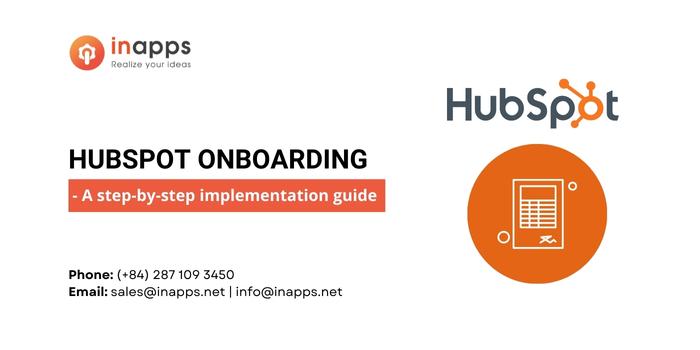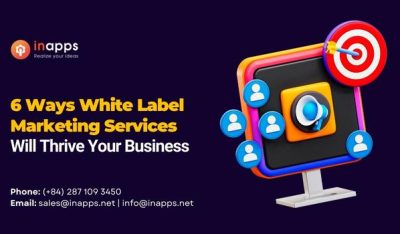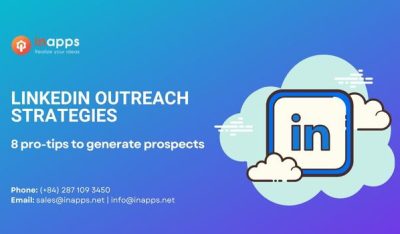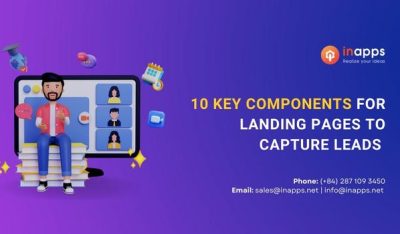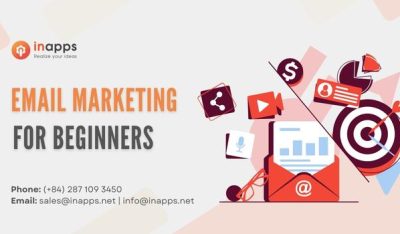- Home
- >
- Inbound Marketing
- >
- HubSpot Onboarding – A step-by-step implementation guide
HubSpot Onboarding Made Simple: A Step-by-Step Implementation Guide is an article sent to you by the InApps editorial team. Hope readers will have more useful knowledge at www.inapps.net
Congrats! You’ve made the decision to streamline your business through HubSpot. Finally, a CRM that allows you to grow your business through a single easy-to-use tool. There’s only one problem: you have yet to begin the HubSpot onboarding process… and you don’t know where to start!
You may be asking yourself, “How do I set up a HubSpot account? And how do I properly integrate my team?” If you’re seeking the answers to these valid questions, then you’ve come to the right place.
In this article, you will learn:
- Why HubSpot is a great investment for growing companies like yours
- What you need to know to easily set up an account
- How to expand your business through the platform
You will also be introduced to a team of HubSpot onboarding experts that is dedicated to the success of your growth on the platform and are excited to lend you a helping hand if you want to get the most out of your HubSpot account.
Ready to simplify your HubSpot onboarding experience? Let’s dive right in!
Why Businesses Love to Onboard HubSpot
As you probably already know by now, HubSpot is a customer relationship management system, also known as a CRM, that allows you to effectively grow your business through one streamlined platform. The system is divided into modules known as “hubs” and includes the following:
- Marketing Hub
- Sales Hub
- Service Hub
- CMS Hub
Since HubSpot is so straightforward and expertly designed for small and large businesses alike, companies love to integrate the platform into their day-to-day use and rely on it to build lasting relationships with their customers.
How Can You Benefit from a HubSpot Account?
HubSpot’s mission is to help companies Grow Better. They do this by giving you the advanced tools you need to focus on what really matters: your customers.
That is why, when you acquire HubSpot as your go-to CRM, you will instantly take customer relationships to a whole new level. Whether your company is big or small, HubSpot helps you hone in on the unique needs of your customers and provide them with the customer experience they so strongly desire.
Furthermore, through HubSpot’s hubs, not only can you automate your marketing tasks and give your sales team everything they need to sell in a more personalized and efficient way, but you can even migrate your entire website to the system!
So, how can you start the HubSpot onboarding process?
1. Set Up Your HubSpot Account
Here’s something we can all agree on: Migrating to any new marketing tool can be a massive time commitment. Since the system is new to you, it can take hours of your time just to figure out how to operate the tool.
For starters, if your internal team does not want to take on the HubSpot onboarding task themselves, then we would advise you to hire an experienced agency like InApps to help you set up your account and train your company to get the most out of your HubSpot investment.
On the other hand, if you plan to tackle the setup process yourself, then keep reading this step-by-step guide to learn exactly what you need to do to get your business up and running on HubSpot!

Follow All of the Instructions
First and foremost, you should never skip steps while you create your account. HubSpot is user-friendly and wants to ensure the success of your setup. Therefore, they offer several initial implementation steps, such as informative videos and certifications, to help guide you through the process.
If you choose to forgo these crucial beginning steps, they might come back to bite you later on down the road! Therefore, be sure you and your team fully understand the CRM as you go ahead and set up your account.
Pro-Tip: You will find it extremely helpful if you create a game plan with your team before you onboard HubSpot. For instance, make sure your entire company knows about the decision to integrate into HubSpot BEFORE you make an account. You can also appoint a specific person to spearhead the initiative and to gather important information and research about the platform to share with the rest of the team.
Don’t Forget Your Technical Configurations
Once you set up your HubSpot account and you have access to your company’s unique login information, you can start to migrate your data into the portal according to your business’s specific needs.
When you’re ready to start this crucial step, be prepared to organize all of your documents, files, and contacts as soon as you put them into the system. If you strategically arrange your data and name conventions in the very beginning, then it will be easier to work with the system in the future.
After all, no one wants to work on a disorganized and cluttered system, especially when business starts to boom!
2. Develop a Project Plan
Now that your account is fully established and your company data is incorporated into the system, the next step in the HubSpot onboarding process is to determine which projects you need to accomplish and what you need to do to achieve your goals through the platform.
Start by outlining your overarching project goals and then discuss with your team which modules your company should pursue. Then, you will have a much easier time choosing the setup of your internal hubs, which leads us to our next point.

Create Strategic Hubs in Your Portal
Through HubSpot, you can simplify the process of reaching your customers through marketing automation, sales components, and service.
When it comes to picking the proper hubs for your business, you will want to make sure they align with your overall CRM strategy. Here is a checklist of the hubs you can integrate into your system and how they will help you:
- Marketing Hub: Accomplish all of the creative inbound marketing campaigns of your dreams, including content marketing, tailored ad campaigns, personalized messaging, lead generation, analytics, and marketing automation.
- Sales Hub: Track your sales pipeline, meet schedules, generate quotes, and give your team everything they need to sell in a more personalized and relevant way.
- Service Hub: Engage with your customers in a way that efficiently guides them to the solutions they need through a specialized knowledge base and customer feedback software system.
- CMS Hub: Utilize content management software that features top SEO recommendations, website themes, and a user-friendly drag-and-drop editor.
Pro-Tip: You can access hundreds of free tutorials and courses to help you get the most out of your HubSpot hubs through HubSpot Academy. Definitely take advantage of this educational page to advance your understanding of the portal and improve your marketing strategy!
Consider Migrating Your Website to HubSpot
Whether you already have an established website or you’re still in the process of building one, consider developing or migrating it to HubSpot’s internal website builder. Not only does the software boast a variety of themes and easily editable pages, but it is also backed by their CRM tools which promote a friendly digital user experience (UX).
Furthermore, HubSpot also promises easy migration to those who already have established websites and ensures your pages are compatible with smartphones and other formats.
If you prefer to keep your original site, you can still choose to install the HubSpot tracking code, which allows you to track visitor behavior and capture form submissions. Or, you can also decide to host only specific parts of your website on HubSpot, such as your blog page and landing pages.
3. Implement Daily Sales Tools
One of the trademark features of HubSpot is its single, shared view of all the customers logged into your portal. In fact, the software lets you quickly set up tasks and calendars, generate engaging content, attract and keep up with leads, and guide customers through the sales pipeline – all with just a few clicks of the keyboard!
Not to mention that the software easily connects to other tools like Google Analytics, so it will be compatible with other parts of your business.

With that being said, you can really grow your business if you get in the habit of using the daily sales tools available to you through the platform. Keep in mind that HubSpot offers tons of free tools as well that will help you with both marketing and sales. Some of these include:
- Marketing Plan Generator
- Industry Benchmark Data
- Free Business Templates
- Make My Persona Tool
Once you explore all of the sales tools, you can choose the ones that suit your day-to-day functions best and go from there!
4. Build an Automated Process
Pay attention to this – you definitely don’t want to miss this next step!
HubSpot masterfully offers several automation processes that range from mundane task setups to major, time-consuming reporting and configurations. Therefore, if you want to save loads of time and money every day, you need to implement marketing and sales automation.

Through automation, you can manage how a lead enters your database the instant a deal is created or how a service ticket is handled from start to finish.
For instance, you can automate e-book downloads that send the contact information of a lead straight to your inbox. Then, you can instantly access data pulled from HubSpot’s internal system about each potential customer and strategically reach them in a tailored way that is personalized to their needs.
Pro-Tip: Take the time to build a strong automated process in the beginning so that you can prioritize time with your customers in the future.
5. Align Your Team with the Platform
As you begin to build up your portal, you can begin to migrate your team to the platform as well.
For starters, create their own personal contact pages, add them to tasks, organize their activities into categories and groups, and get them accustomed to the ins and outs of their new HubSpot domain.

Set Your Team Up for Success
During the migration process, ensure everyone receives proper training on how to navigate the system and complete tasks. For instance, make sure each team member knows how to:
- Log into their HubSpot portal
- View daily calendars
- Monitor campaigns
- Create customer contacts
- Move leads through the sales funnels
Like any new system, encourage your team to ask questions about their HubSpot experience so you can help them solve any issues they may face through the onboarding process.
Pro-Tip: Create a timeline that lays out and organizes the HubSpot onboarding process for your team. That way, you can familiarize each member with the system within a specific timeframe.
6. Become Savvy With Reporting & Insights
Speaking of familiarizing your team with HubSpot, you will also want to get to know the important reporting tools and dashboards found within your company’s portal. Through these tools, you can hook up your Google Analytics account and track KPIs needed to prove marketing ROI.
And that’s just the tip of the iceberg!

Define Audience, Lifecycles, and Predictions
HubSpot’s reporting and analytics tools can also help you define your target market, create SEO-proof content that attracts your ideal customers, generate lifecycles, and make predictions for the future growth of your business.
When used properly, these capabilities will help you expand your company and do what you love most: creatively connect with your customers.
Elevate Your Onboarding Experience With InApps
As you can see, HubSpot is a fantastic CRM tool to add to your marketing arsenal. Not only can you easily improve customer relationships through the system, but you can also streamline your entire business to one, simple place!
Want to ensure your business is set up properly on HubSpot so you can get the most out of your investment? Check out our accelerated HubSpot training program, which gives you the learning curve you need to get your business up and running on HubSpot in the most effective and constructive manner. Not only will you maximize the full capabilities of HubSpot, but you will also:
- Receive live technical consulting to help you validate various use cases
- Onboard your team with a custom training plan
- Setup workflows so you can get started faster than on your own
- And so much more!
Don’t dive head-first into the process blindly. Talk to one of our strategists to learn more about our advanced HubSpot onboarding program and feel confident as you move forward.
Follow this to make sure you’ve got HubSpot Onboarding Made Simple: A Step-by-Step Implementation Guide. Save and share with those around you these extras.
To learn more about Inbound Marketing
Contact us:
www.inapps.net
List of Keywords users find our article on Google
Let’s create the next big thing together!
Coming together is a beginning. Keeping together is progress. Working together is success.




